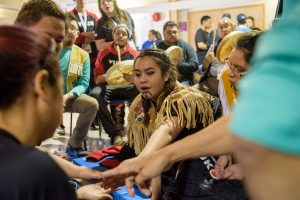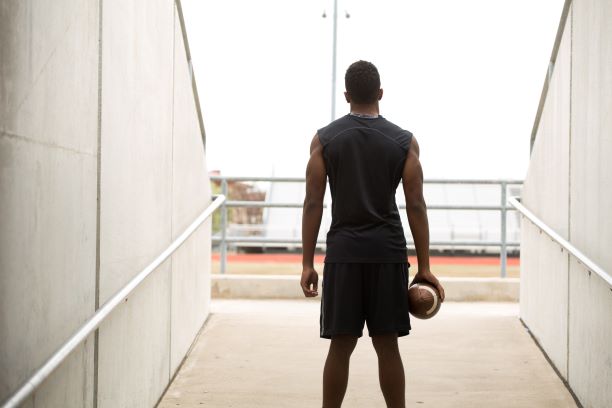“Some are posting on social media. Some are protesting in the streets. Some are donating silently. Some are educating themselves. Some are having tough conversations with friends & family. A revolution has many lanes – be kind to yourself and to others who are traveling in the same direction just keep your foot on the gas”
Octavia Spencer
As Canadians reflect, seek education, gather knowledge and take action on anti-racism, these are some of the key questions to help guide the process:
 How can we, as Canadians, continue to ingrain diversity and inclusion into our communications, content and programs?
How can we, as Canadians, continue to ingrain diversity and inclusion into our communications, content and programs?- How can Canadians focus on providing content, resources and programs that can reduce barriers for marginalized communities in sport?
To help create a safe, inclusive and welcoming environment in Canadian sport, below is a collection of key terms, educational resources and support organizations:
Key Terms:
- Ally is a member of a different group who works to end a form of discrimination for a particular individual or designated group.
- Anti-racism is the active process of identifying and eliminating racism by changing systems, organizational structures, policies and practices and attitudes, so that power is redistributed and shared equitably.
- Individual racism is structured by an ideology (set of ideas, values and beliefs) that frames one’s negative attitudes towards others; and is reflected in the willful, conscious/unconscious, direct/indirect, or intentional/unintentional words or actions of individuals.
- Institutional racism exists in organizations or institutions where the established rules, policies, and regulations are both informed by, and inform, the norms, values, and principles of institutions. These in turn, systematically produce differential treatment of, or discriminatory practices towards various groups based on race. It is enacted by individuals within organizations, who because of their socialization, training and allegiance to the organization abide by and enforce these rules, policies and regulations. It essentially maintains a system of social control that favours the dominant groups in society (status quo).
- Unconscious bias is an association or attitude about a person or social group that, while not plainly expressed, operates beyond our control and awareness, informs our perceptions, and can influence our decision-making and behavior.
Sources: Canadian Race Relations Foundation, Alberta Civil Liberties Research Centre and Catalyst
National Day for Truth and Reconciliation
September 30, 2021 marks the first ever National Day for Truth and Reconciliation. Join us in recognizing and reflecting with these resources:
- Read the Truth and Reconciliation Commission Calls to Action that include clear and concrete recommendations to redress the legacy of residential schools and advance the process of Canadian reconciliation. The Truth and Reconciliation Commission’s Final Report can also be found here.
- Visit the National Centre for Truth and Reconciliation (NCTR), an online place of learning and dialogue where the truths of Residential School Survivors, families and communities are honoured and kept safe for future generations. https://nctr.ca/education/trw/general-public-schedule
- Learn the history of the land you live on, or the closest residential schools
- Read a book
- “A Knock on the Door: The Essential History of Residential Schools from the Truth and Reconciliation Commission of Canada” by Phil Fontaine and Aimée Craft
- “21 Things You May Not Know About the Indian Act: Helping Canadians Make Reconciliation with Indigenous Peoples a Reality” by Bob Joseph
- “Five Little Indians” by Michelle Good
- “Indigenous Relations: Insights, Tips & Suggestions to Make Reconciliation a Reality” by Bob Joseph
- “The Reconciliation Manifesto: Recovering the Land, Rebuilding the Economy” by Arthur Manuel and Grand Chief Ronald Derrickson
- Read an article or a report
- Where are the Children? Healing the legacy of the residential schools (Aboriginal Healing Foundation and Legacy of Hope Foundation) / Where are the Children? Guérir des impacts des pensionnats indiens (Fondation autochtone de guérison et Fondation autochtone de l’espoir) »
- A history of residential schools in Canada (CBC News) / Les pensionnats autochtones en 7 questions (Radio-Canada)
- Missing and Murdered Indigenous People: The Report – https://www.mmiwg-ffada.ca/final-report
- OLY story: Tom Longboat was a residential school survivor https://www.cbc.ca/sports/2.9056/canada-150-tom-longboat-1.406756
- Listen to a podcast
- Follow Indigenous-led social media accounts
SIRC Blog
Tackling Racism on Campus
by Devon Bowyer and Jada Roach, BIPOC Varsity Association, University of Toronto
SCRI Conference 2020
At the SCRI Conference, Diversity and Inclusion were at the core of the discussions. The conference brought together leading researchers and practitioners to discuss diversity and inclusion in the Canadian sport context, share tranformational programs and highlight research being done.
Driving Change Spotlights
Black Canadian Coaches Association
Website: thebcca.com
Dr. Tricia McGuire Adams
Pour3Points
Website: pour3points.ca
Panel
Resources from SIRC’s Experts
Books
- How to be an Antiracist by Ibram X Kendi
- White Fragility by Robin DiAngelo
- So you want to talk about race by Ijeoma Oluo
- The Skin We’re in by Desmond Cole
- Policing Black Lives by Robin Maynard
- 11 Books by Black Canadian Authors
Educational Resources
- Recommended Anti-racism resources | Government of Canada
- Policy and guidelines on racism and racial discrimination » Part 1 – Setting the context: understanding race, racism and racial discrimination | Ontario Human Rights Commission
- Glossary of Terms | Canadian Race Relations Foundation
- Doing Justice by Black Canadians | Policy Options, by Anthony Morgan
- Educational resources on racism/anti-black racism | The Canadian Centre for Diversity and Inclusion
- Overcoming bias in the workplace: How leaders can drive change | Smith School of Business
- Navigating race in Canadian workplaces A toolkit for diversity and inclusion practitioners | Canadian Centre for Diversity and Inclusion
- Infographics: Overcoming Conversation Roadblocks and What is Unconscious Bias? | Catalyst
- Policy and Program Considerations for Increasing Sport Participation Among Members of Underrepresented Groups in Canada. 2nd Edition (2019) | The Government of Canada
- Policy on Aboriginal Peoples’ Participation in Sport | The Government of Canada
- The Final Report of the Truth and Reconciliation Commission of Canada: Summary & Calls to Action | Truth and Reconciliation Commission of Canada
Organizations
 The Canadian Race Relations Foundation is dedicated to the elimination of racism and all forms of discrimination in Canadian society.
The Canadian Race Relations Foundation is dedicated to the elimination of racism and all forms of discrimination in Canadian society.
The Canadian Anti-Racism Education and Research Society provides public education about institutional racism, and offers victim support services for hate crime and systemic racism.
The Canadian Anti-Hate Network have missions focused on shutting down hate groups.
Explore SIRC’s website to discover additional content and resources on diversity and inclusion:


